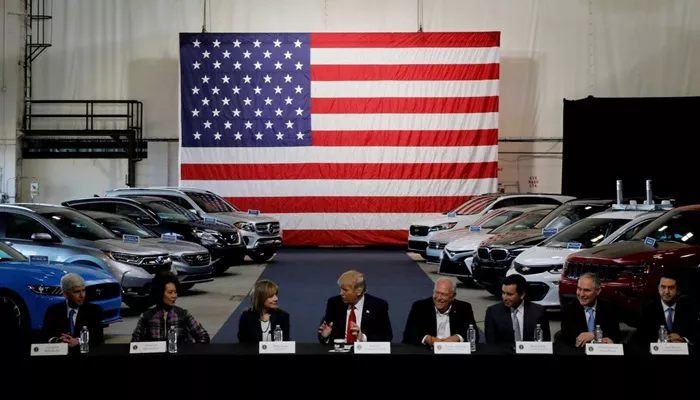President Donald Trump declared on Wednesday that the U.S. will impose a 25% tariff on imports of foreign-made cars, marking a significant step in his ongoing trade war with America’s allies. The tariffs will take effect on April 2, aligning with Trump’s deadline for announcing a range of retaliatory tariffs on U.S. trade partners.
“This is the beginning of Liberation Day in America,” Trump stated during a speech in the Oval Office. He emphasized that U.S.-made cars would be exempt from the tariff. “If you build your car in the United States, there will be no tariff,” he added.
When asked whether carmakers could do anything to reverse the tariffs, Trump responded firmly: “This is permanent, 100 percent.”
Earlier this month, Trump temporarily exempted products meeting the 2020 United States-Mexico-Canada Agreement (USMCA) standards from new tariffs. However, no such exemptions were announced this time. Trump suggested the move would lead to more car manufacturing in the U.S.
A U.S. official confirmed that the tariffs would apply not only to finished cars but also to car parts, including engines, transmissions, power-train components, and electrical parts. The 25% levy will be in addition to any existing tariffs on these imports.
Under the USMCA, cars that meet its trade requirements will face a tariff only on their foreign-made parts. A process will be developed to calculate tariffs on non-U.S. parts, a White House factsheet explained.
“These tariffs will generate revenue to fund the largest tax cut in American history,” the official stated. “Tariffs equal tax cuts.”
The White House invoked a 1962 national security law to justify the tariffs, arguing that the U.S. car industry is critical to national security. Officials claimed the industry had been undermined by excessive imports that threatened domestic manufacturing and supply chains.
The announcement prompted strong opposition from carmakers, who warned that the tariffs would disrupt supply chains and lead to higher prices for American consumers.
General Motors’ stock dropped by 7% in after-hours trading on Wednesday, while shares of Stellantis, the parent company of Chrysler, fell by 4%. Ford’s stock also slipped about 5%.
In Asia, shares of Japanese automakers took a hit as the news spread. Subaru and Mazda led the declines, falling by more than 5%. Mitsubishi Motors dropped by 4%, while Toyota and Nissan saw losses of nearly 3%.
Approximately half of the cars sold in the U.S. are imported, with U.S.-assembled vehicles containing nearly 60% foreign-made parts, according to analyst Daniel Roeska at Bernstein.
“A 25% tariff on automotive imports that lasts more than a few weeks could have a severe impact on the entire sector,” Roeska said, adding that automakers would struggle with the financial burden.
Jessica Caldwell, head of insights at Edmunds, an automotive research firm, predicted that vehicle prices would likely rise as manufacturers passed on the additional costs to consumers.
Mexico, the largest exporter of cars to the U.S., sent 2.77 million cars across the border in 2024. Most of these vehicles entered tariff-free under the USMCA. The new tariffs are expected to have a devastating impact on Mexico’s economy, where 1 million people are employed in the car manufacturing sector, which represents about 4% of the country’s GDP.
Canadian automakers also criticized the move, with Prime Minister Mark Carney stating that his government would use retaliatory tariff revenues to protect workers and businesses affected by the decision.
“This is a direct attack on the workers I stood in front of this morning, at the Ambassador Bridge,” Carney said, referring to the major crossing between Canada and the U.S. “That bridge is a symbol of the close ties between our countries.”
The European Union also expressed disappointment over the tariffs. European Commission President Ursula von der Leyen stated, “We will assess this announcement along with other measures the U.S. is considering in the coming days. The EU will continue to seek negotiated solutions while safeguarding its economic interests.”
The United Auto Workers (UAW) union, however, welcomed the new tariffs. “Ending the race to the bottom in the auto industry starts with fixing our broken trade deals,” said UAW President Shawn Fain.
Trump’s announcement is the latest in a series of trade actions he has taken since returning to office in January. These include a 20% tariff on all goods from China and a 25% tariff on steel and aluminum imports. This week, Trump also stated that the U.S. would impose 25% tariffs on goods from countries buying Venezuelan oil and gas, with the new levies set to take effect on April 2. This move is expected to impact China, India, Spain, and Italy, among others.

